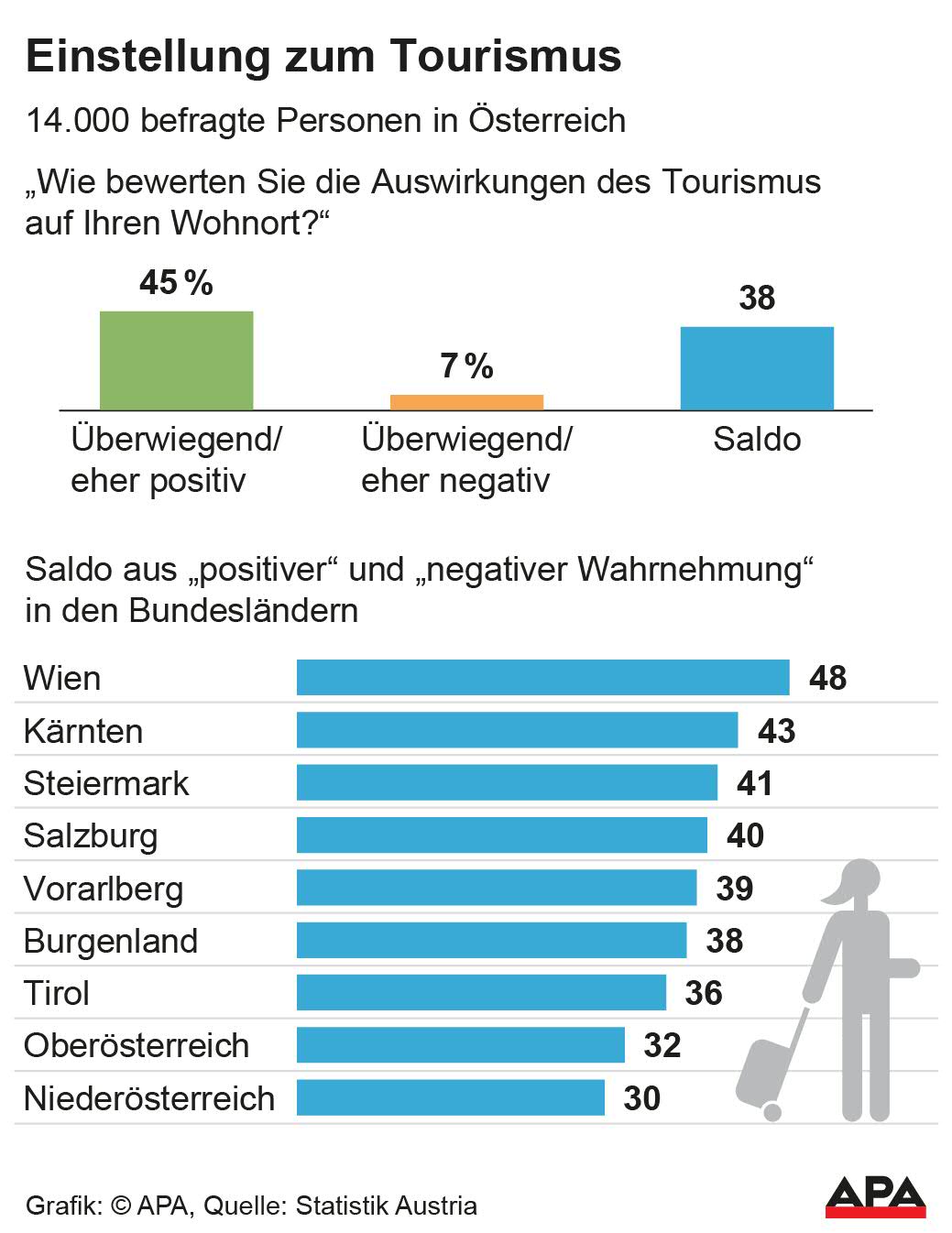Study Shows High Tourism Acceptance Among Austrians
A study presented by Statistics Austria in Vienna with around 14,000 participants shows that tourism is appreciated not only for its economic importance but also for cultural exchange and regional revitalization. However, there is dissatisfaction as noise pollution from tourists and overcrowded places are perceived as disruptive.
Regional Differences in Tourism Acceptance
Regarding the general approval of the sector, regional differences are evident. Tourism acceptance is highest in Vienna, as statisticians calculated based on the difference between positive and negative perceptions. For the federal capital, the value is 48 percentage points, followed by Carinthia (43), Styria (41), Salzburg (40), Vorarlberg (39), and Burgenland (38). Below the federal average of 38 percentage points were Tyrol (36), Upper Austria (32), and the last place Lower Austria (30).

Neutral results or individuals who do not have a clear tendency in one direction were not directly included in the calculation of the acceptance balance. The value is not irrelevant - nationwide, 39 percent gave a neutral response - as the relatively low balance in Upper Austria can be explained by a high value of neutral assessments, as tourism expert Peter Laimer from Statistics Austria explained during the study presentation. Similarly, in tourism-strong regions like Vienna and Salzburg, there is generally great approval for the industry, but here the annoyance with accompanying disturbances such as crowds is also strongest.
State Secretary Sees No Problem with Tourist Influx in Austria
Tourism State Secretary Elisabeth Zehetner (ÖVP) does not see any problems with mass tourism, however. The politician pointed to the generally high approval for the industry, and also noted that Austrian tourism policy has been focusing on quality tourism for years. "We need tourists who do not just stroll through the city center for a few hours, but we need guests who take advantage of cultural offerings and also consume locally. And we have already succeeded in this path and we must continue it consistently," said Zehetner. In the past, the flood of tourists has repeatedly been an issue around hotspots like Salzburg's city center or Hallstatt in Upper Austria.
At least a broad harmony between vacationers and locals does not or only partially exists in other European countries. In recent weeks, there have been renewed protests against mass tourism in Mallorca, Spain, but also in metropolises like Barcelona or Rome, tourist crowds repeatedly cause unrest. The results of the acceptance study in Austria, which is now to be conducted regularly, are not comparable with those countries, by the way. However, they want to advocate at the European level for studies with a similar design to be developed in other countries, emphasized Zehetner.
The politician now wants to incorporate the study results into a reform of the tourism strategy, the so-called "Plan T," which has been in place since 2019. It is already "a bit outdated," and now it is about taking into account issues such as labor shortages and climate change, as well as technical developments like artificial intelligence. The corresponding process is to start in the summer and involve not only the population but also various stakeholders and experts. According to Zehetner, results could be available in just over a year.
The FPÖ reacted with criticism. The "Plan T" is "ridiculous" and is now "only laughed at" by the industry, said tourism spokesperson Christoph Steiner in a statement. Instead of initiating reforms such as revising the depreciation period or bureaucratic relief for the industry, "now come surveys and participation processes," said the Freedom Party National Council member.
The city of Vienna, on the other hand, saw its course in tourism policy confirmed. For Mayor Michael Ludwig (SPÖ), the planned reform is also an opportunity to make the "Viennese way" a model and to contribute experiences in dealing with challenges such as labor shortages, it was stated in a communication.
(APA/Red)
This article has been automatically translated, read the original article here.





